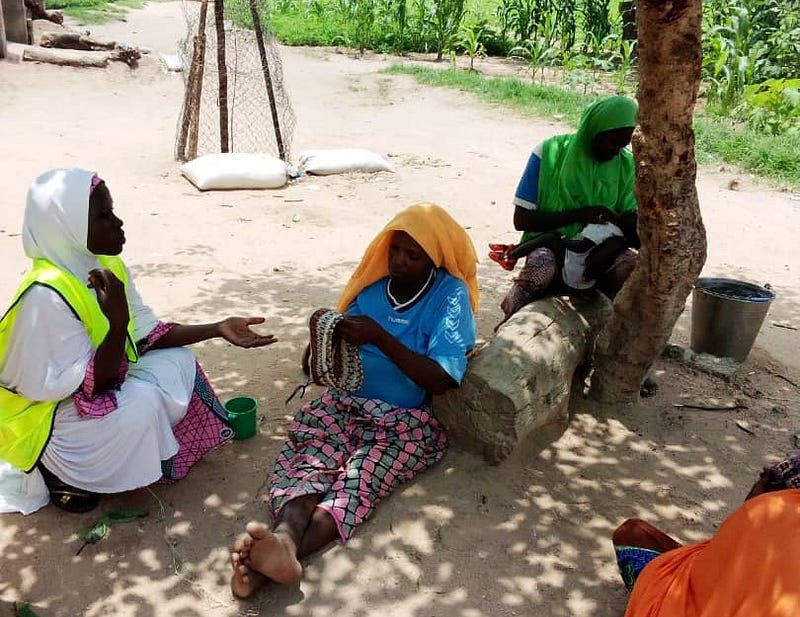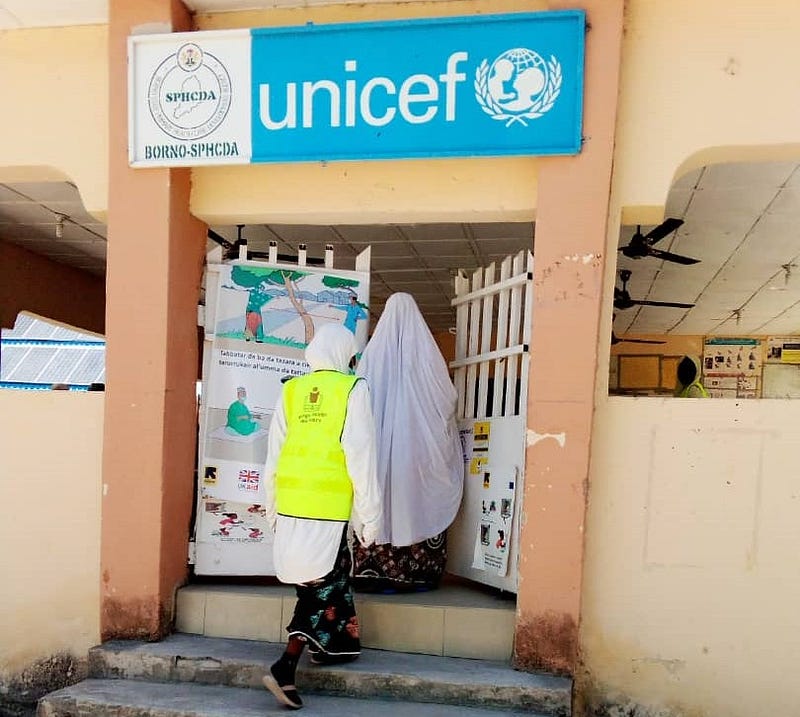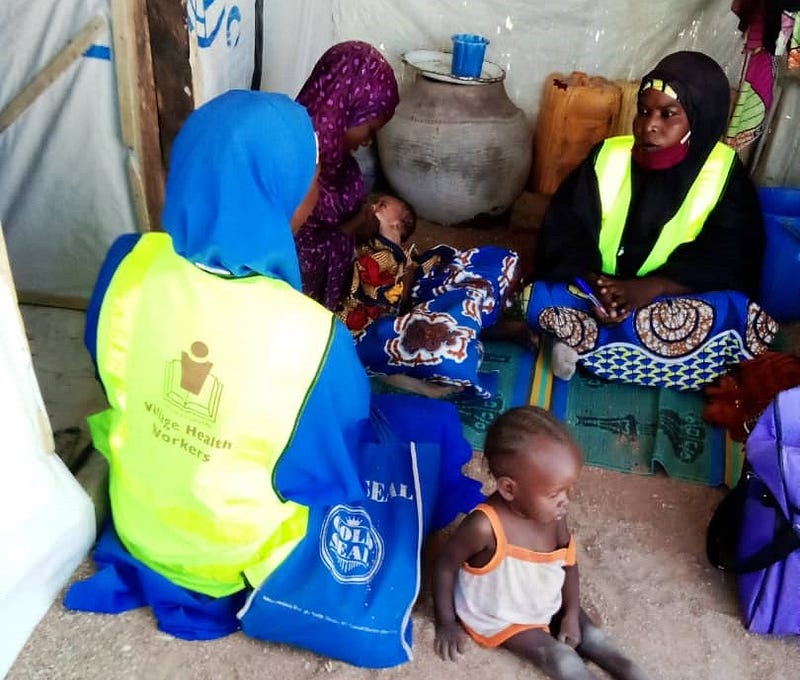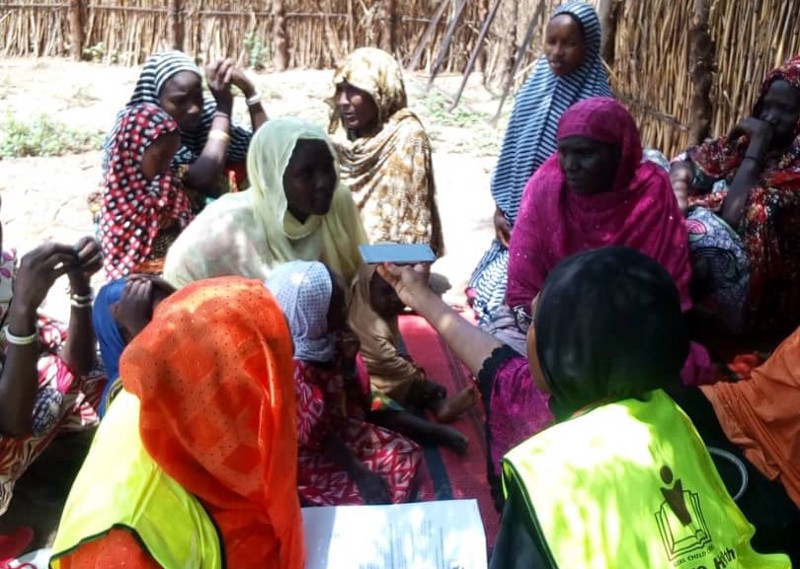“Educate a boy, and you educate an individual. Educate a girl, and you educate a community.” — Adelaide Hoodless
In Nigeria, maternal health care is fragmented, so maternal health services are provided by various service providers in the public sector, private sector, informal providers and even religious institutions. In communities, culture and tradition influence maternal health-seeking behaviour and consequently, women turn to older women in the community or traditional birth attendants for maternal health care, particularly when they are about to give birth.
Health education, community mobilisation and skilled birth attendants are key to reversing trends in adverse maternal outcomes in rural communities which is what Girl Child Concerns is working to address with support from MSD for Mothers. Girl Child Concerns is working to address the poor state of maternal health care in rural communities in Borno State. They are doing this by empowering rural adolescent girls to become volunteer village health workers in Borno State. Since 2018, they have been working to strengthen the voice and power of rural adolescent girls by supporting their transition from secondary school to becoming village health workers. Through this initiative, they are addressing the acute shortage of female health care workers and thereby improving maternal health care in rural communities in Borno State.
To facilitate the Village Health Worker programme, Girl Child Concerns is currently working in three pilot Local Government Areas (LGAs) in Borno State: Konduga, Gwoza and Bama LGAs. To commence the programme, in collaboration with community leaders, girls are selected upon completion of their secondary school education. The girls are then trained for two weeks at the Maiduguri College of Health Technology. The training entails one week of intensive classwork and one week of practical training at various health facilities in Maiduguri, capital of Borno State. They are trained in facilitating first aid, how to conduct house-to-house visitation and how to educate and encourage mothers about better maternal health care practices including hygiene in pregnancy, nutrition, the importance of using skilled birth attendants and going for antenatal care (ANC) and postnatal care. They are also taught how to identify the danger signs in pregnancy including excessive bleeding, premature rupture of membranes, anaemia among other danger signs. With support from, and supervision by Community Health Extension Workers (CHEWS), the village health workers are able to effectively facilitate these activities. On the supply side, to ensure that the quality of care is up to par, Girl Child Concerns has so far engaged 375 midwives, nurses and CHEWS in capacity building. As a result of this, women have a better chance of receiving quality maternal health care when referred to health care facilities.

According to Fatima Jarmai, Programme Officer of the Village Health Worker programme of Girl Child Concerns, there are currently 95 village health workers living and working in Gwoza, 78 in Bama and in Konduga, 58 village health workers. Each village health worker is attached to a primary healthcare centre to which they refer women. The village health workers work collaboratively with primary health centres to ensure that every woman they refer is well attended. They ensure that every woman attends antenatal care at the primary healthcare centre at least four times during the course of her pregnancy, from as early as 15 weeks. The village health workers keep and update daily logbooks for every woman in their community, under their care, detailing her ANC dates, scan sessions, list of medicines, doctor appointments, estimated date of delivery and other important information that will ensure that the women receive the best quality of care during pregnancy, while giving birth and postpartum. They also follow-up with the women to ensure that they attend to additional treatment and examination.
Fortunately, the efforts of the village health workers are paying off. The village health workers testify that the women in the rural communities have been able to successfully change their behaviour towards hygiene in pregnancy, antenatal care, nutrition and this has positively impacted their maternal health-seeking behaviours. Regardless of the time of the day, when a call is made, the village health worker is available within a few minutes and when pregnancy complications are identified, the women are quickly referred to the nearest primary health centre. When a woman is in labour, the village health worker attending to her is immediately called upon by her family members to accompany her to the closest primary health centre where delivery will be successfully facilitated by a skilled birth attendant.

In a situation where a woman is at risk, village health workers are able to identify pregnancy complications such as preeclampsia. On one occasion, in Gwoza LGA, Hafsat, a village health worker was called at night to the home of an 8-month pregnant woman who was bleeding. The pregnant woman insisted that she did not see the need to go to the health facility because in her words, the bleeding was ‘painless’. The village health worker insisted and informed her of the dangers of the bleeding, including loss of the foetus or loss of her life. She was then transported to Gwoza General Hospital where she had to undergo an emergency caesarean section which saved her life and that of her baby.
Before the advent of the village health workers in the rural communities, antenatal care attendance in the primary health centres hovered around four to five women per week, but since the arrival of the village health workers, antenatal care attendance has increased to about 40 women per session. The reason for this success is attributed to the trust the women have in the village health workers because they are girls and women in their communities, whom they know and trust, and who understand them, understand their background, understand their challenges and can relate with their situation. The village health workers also find value in the services they are able to voluntarily provide to their fellow women. Amina, a village health worker from Bama LGA, in her words said: “I have gained so much knowledge as a village health worker in family planning and good hygiene. I refer the women to the PHC to get medicines and this gives me joy. In a day, I visit between 20–22 households”. She added: “Being a village health worker has become my normal way of life, besides, I have less responsibility because I have no husband and no children and I have all the time to carry out my duties as a village health worker.”
Collaboration with other stakeholders and members in the community is crucial to ensure the continued success of this programme. Girl Child Concerns has partnered with road transport workers to facilitate the movement of pregnant women to health facilities. Joining forces with other non-profit organisations has ensured that women in the community are provided with maternal medicines they need during pregnancy and postpartum. Community leaders helped to obtain buy-in from members of the community, including the adolescent girls trained to become health workers and the women in community to encourage them to seek the services of the trained health workers. Bulama Mele, a community leader in Konduga LGA said that before the introduction of the village health workers, there were fewer functional health facilities, with no medicines or health care workers, and less importance was given to maternal health care. However, since the start of the training by Girl Child Concerns, health care workers have been employed at the facilities and the village health workers are playing a significant role in easing the health care of the communities.

The Borno State government has taken notice of the work that Girl Child Concerns is doing, with the deployment of village health workers to support rural maternal health care, and they have provided support to train and mobilise more village health workers into the communities. This has increased the number of village health workers in the field from 240 to 860 village health workers, operating in the rest of the state, beyond the three pilot LGAs of Konduga, Gwoza and Bama. In all, through the Village Health Worker programme, 65,000 women have been reached in best practices in maternal, newborn and child health (MNCH), nutrition and child spacing.
To ensure sustainability of the initiative, Girl Child Concerns has obtained commitment from the local government offices, community leaders, religious leaders such as the Emir of Gwoza, political leaders such as Senator Ali Ndume, representing Borno South to ensure that the work of village health workers in rural communities continues and they are provided with adequate technical, structural and financial resources. Girl Child Concerns has also received commitment from the Provost of the Maiduguri College of Health Technology to continue training village health workers for rural communities. Girl Child Concerns has granted the school permission to run the Village Health Worker training curriculum and programme.
The Girl Child Concerns Village Health Worker programme is an ideal model for providing quality maternal care to women in rural and hard-to-reach communities. The programme is enabled by the dedicated team training the adolescent girls, who with determination and heart are empowering the women in their community. The programme however, can only effectively run if stakeholders at all levels: government, healthcare, finance, academia, civil society and private sector, come together to support community members to enable service improvements in maternal health care delivery. This programme is made possible with support from MSD for Mothers. The challenge of deploying health care workers to rural communities can be made possible, if all stakeholders work together to put into action, sustainable solutions that bring quality improvements in the delivery of maternal health care.


